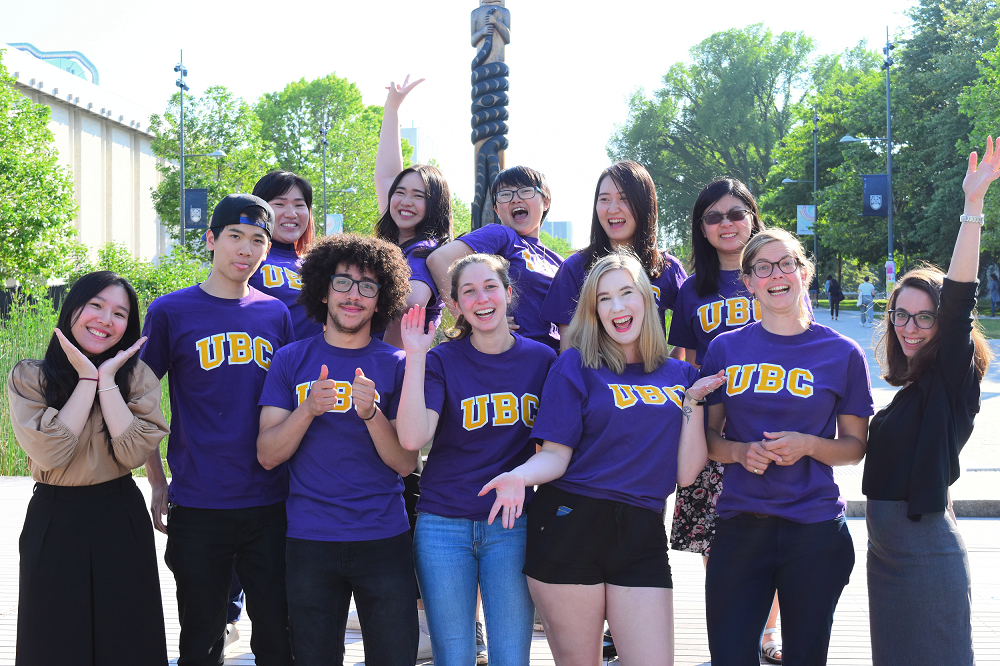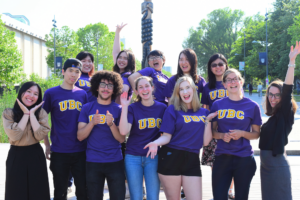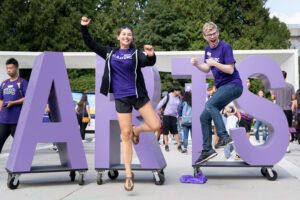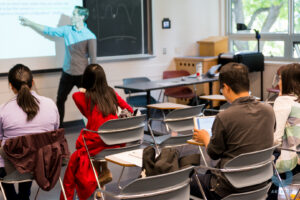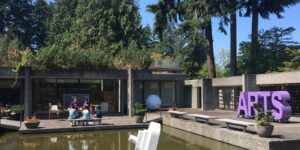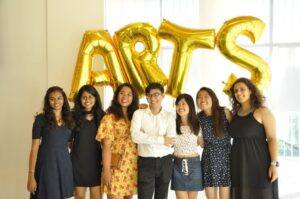Arts VSP is ideal for students interested in gaining international experience, meeting students from other universities and experiencing Canadian culture, while enhancing their learning experiences in one of the world’s top ranked universities. Students will enjoy university residence life and will have the opportunity to take part in events and field trips organized specifically for Arts VSP students.
What you might expect/course format
A typical course includes an interactive lecture and discussion component and will have a mix of in-class and take-home assignments. Assignments can also include individual or group projects, quizzes, and exams.
Some courses will offer academic field trips that take place on or off campus. These field trips complement classroom learning, and may include community engagement or fieldwork.
The Arts Vancouver Summer Program’s instructors and teaching assistants are committed to providing a supportive learning environment for students. During the program, instructors provide support in class and by email.
June 2024 Course Packages
Culture and Communication
This introductory course provides an anthropological perspective on how language, as a common human condition, shapes social life. In exploring the intertwined relationship between language and culture, the class will introduce the foundational concepts and methods used in anthropology to study patterns of communication and socio-cultural practices. Language is a substantial force in formulating cultural beliefs, ideologies, categories of social identity, community memberships, and power relations. After taking this course, students will be well-equipped to answer questions such as: What is language and how does it shape our social worlds? How can linguistic theories help us grasp cultural phenomena? How do people use language to form their identities? And how do various societal factors influence intercultural communication? Students will gain an understanding of the relationship of language to their own and other cultural contexts.
Global Journalism
This course will examine the development of media technologies, their applications, and their cultural, political and social impacts. Students will also gain hands-on experience in learning how to think and operate like a professional journalist in a simulated multimedia environment. It is designed to introduce students to the grammar and syntax of media across platforms, based on a core journalistic skill set of interviewing, reporting, news writing, and research methods in tandem with the most current technical tools and technologies in digital media.
Prerequisites: No prerequisites
Minors (students aged under 19 at the start of the program): Not Accepted
April 4, 2024: This course package has been canceled for VSP 2024 June Session. If you have applied to this course package, you should have received an email with the instructions to proceed with your application. If you have any questions about the cancellation, please email vsp.applications@ubc.ca.
From Drama to Theatre: How does a Play Mean?
This course will explore the languages of theatre within Vancouver’s rich and lively performance culture. How do individual artists–directors, actors, designers–transform a playwright’s ideas into unique and original art? In what ways, for example, will a Shakespeare play produced in Vancouver become a Canadian play? These questions and more will be explored in relation to two plays a week in production in Vancouver during the term. We will examine and discuss the play scripts, attend the plays, and meet “backstage” with some of the artists themselves. Plays chosen will span a variety of genres, including Shakespeare (in production at Bard on the Beach Shakespeare Festival), musicals (in production at Theatre Under the Stars and the Arts Club Theatre Company), plus additional dramas and comedies in production.
Documentary and the City
For the first time in human history a majority of the world live in cities. While there are multiple threats posed by the growth of cities, such as poverty, migration, and social divisions, there are also surprising and innovative practices that emerge. The city of Vancouver is brimming with stories that can tell us many things about the world we live in. Focusing on documentary films and film making, this course introduces students to these often hidden stories of the city through key writings, films, and direct engagement with life in Vancouver. Students will use creative methods to connect critical analysis with their everyday experiences, while authoring basic documentary projects in neighbourhoods throughout the city.
Prerequisites: No prerequisites
Minors (students aged under 19 at the start of the program): Accepted on a case-by-case basis
April 4, 2024: This course package has been canceled for VSP 2024 June Session. If you have applied to this course package, you should have received an email with the instructions to proceed with your application. If you have any questions about the cancellation, please email vsp.applications@ubc.ca.
International Trade and Financial Markets
The modern global economy is intricately tied together through networks of trade and financial interconnections. This course will give students an understanding of the structure and functions of international trade and international financial markets. The course will give a basic introduction to the forces driving international trade in goods and financial assets among nations of the world. The major theories of international trade and financial markets will be reviewed. Topics covered will include the determinants of a country’s trading patterns, recent trends in international trade such as offshoring and global supply chains, the role of financial markets in international development, the future of the Renminbi as an international currency, the understanding of international financial crises, and sovereign debt crises.
Dynamics of Democracy and Global Uprisings
This course deals with some of the key concepts of Political Science, matching them with developments around the globe. We begin by considering some of the concepts and controversies in defining democratic and non-democratic systems. How do we tell democratic systems from non-democratic ones? Are all democracies the same, or at least similar? Is citizen satisfaction a distinctive quality of those regimes? We then link these discussions to the rising wave of global discontent around the globe. The seemingly-universal quality of these uprisings gives a strong indication that struggles we are witnessing are no longer over democracy versus other systems; instead, what seems to be at issue are the meanings and practices largely associated with democratic regimes, the expectations of peoples, and what regimes provide. Finally, we focus on specific uprisings, chosen by the students, in an attempt to contextualize discussions and make sense of recent global developments in an informed and thoughtful manner.
Prerequisites: No prerequisites
April 4, 2024: This course package has been canceled for VSP 2024 June Session. If you have applied to this course package, you should have received an email with the instructions to proceed with your application. If you have any questions about the cancellation, please email vsp.applications@ubc.ca.
The Ethics of Big Data
Data is everywhere, and we are getting ever more sophisticated in collecting it, analyzing it, and using it. This creates massive opportunities for both financial gain and social good. It also creates dangers such as privacy violations, discrimination, and threats to self-determination and collective, democratic determination. This course introduces students to the legal, policy, and ethical dimensions of big data, predictive analytics, the use of algorithms to make decisions, the use of algorithms to present information and opportunities for choice, and related techniques. Topics discussed include the correlation vs causation distinction in data analysis, online identity, privacy, big data use in social institutions, and mass surveillance. Ethical principles and problems discussed include the doctrine of double effect, doing vs. allowing harm, theories of personal identity, and aspects of liberal morality. Through class discussions, case studies and exercises, students will learn the basics of ethical thinking in data science, understand the history of ethical issues in scientific work, and study the distinct ethical challenges raised by the increasing role of big data in our lives.
Working with Big Data
Data is becoming increasingly available and information is becoming increasingly valuable. This course introduces students to the methods and tools needed to effectively collect, process, and analyze big data. Through class lessons, hands-on computer-lab exercises, and practical case studies, students will learn the basics of computer programming, data wrangling and manipulation, data visualization, statistical analysis, and machine-learning. At the end of this class, students will understand the basics of how to use the Python programming language and key data science tools such as Jupyter and Pandas. Students will develop the knowledge and experience to apply them to important questions in economics, political science, finance, public health, demographics, and public policy. No previous computer programming experience is required, and only a laptop computer with a web-browser is required for assignments and classwork.
Prerequisites: No prerequisites
For more information
For VSP Arts-specific questions, email Emily Chou, International Summer Program Coordinator, at arts.vsp@ubc.ca.
Student testimonials
– Ethan, VSP Arts Student
– Tongfong, VSP Arts Student, 2018
